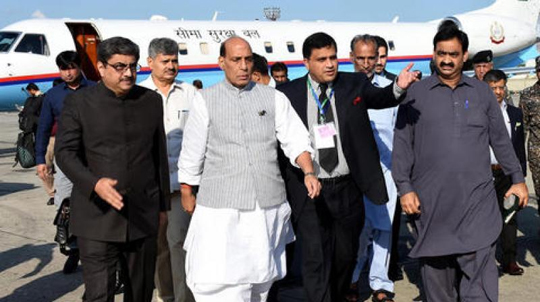Islamabad, Aug 5: India on Thursday asked Pakistan to stop encouraging terror groups and the “glorification” of terrorists, and also called for strongest action against those nations supporting terrorism.
Amid strains in the Indo-Pak relations, Home Minister Rajnath Singh said mere condemnation of terrorism and terrorists is not enough and that there are “no good terrorists or bad terrorists”.
Singh, in his address at the seventh Saarc Interior Ministers Conference, said terrorism continued to be the biggest challenge and threat to the region.
The current strain in the relations was evident when Singh came face-to-face with his Pakistani counterpart Chaudhary Nisar Ali Khan for the first time on Thursday.
The two leaders barely shook hands, not even for a formal handshake, before Singh moved ahead to enter the meeting hall.
Members of the Indian media, who came from New Delhi, were not allowed to cover the conference and were kept at a distance by Pakistani officials, leading to a verbal duel between a senior Indian official and a Pakistani officer.
The home minister also skipped the lunch hosted by Khan after the meeting as the host had left the venue.
Speaking in Hindi at the conference, Singh said there should be “strongest action not only against terrorists or organisations, but also against those individuals, organisations and nations who support terrorism”.
“It also needs to be ensured that terrorism is not glorified and is not patronised by any state,” Singh said, in a veiled dig at Pakistan Prime Minister Nawaz Sharif.
Singh’s comments came against the backdrop of Sharif’s praise of Hizb commander Burhan Wani, who was killed in an encounter in Jammu and Kashmir on July 8. Sharif had also termed the militant a martyr, much to India’s ire.
“One country’s terrorist cannot be a martyr or freedom fighter for anyone. I also speak for the entire humanity — not just for India or other Saarc members — in urging that in no circumstances should terrorists be eulogised as martyrs,” Singh said.
He also called for the isolation of countries or individuals who provide any kind of support, encouragement, sanctuary, safe haven or assistance to terrorists.
“Terrorism remains the biggest challenge and threat to our peace. South Asia continues to be deeply affected by this malady, as witnessed most recently in cowardly terrorist attacks in Pathankot, Dhaka, Kabul and other places,” Singh said, after Sharif and Khan’s talks at the meeting.
Singh said the will and mandate of the international community against proscribed and wanted terrorists and their outfits must also be respected and implemented.
He called for the implementation of the Saarc Regional Convention on Suppression of Terrorism and its Additional Protocol, saying that it was crucial in the common fight against terrorism.
He drew the attention of the participants to ratification of the Saarc Convention on Mutual Assistance in Criminal Matters.
He also thanked the participants for extending support to India’s proposal for being the host of the second meeting of the high-level group of experts to strengthen the Saarc anti-terrorism mechanism in Delhi from September 22 to 23.
No blackout of speech, says govt
India on Thursday described the reports of a ‘blackout’ of Home Minister Rajnath Singh’s statement during the Saarc ministerial meeting as “misleading”, PTI reports from New Delhi. “It is the standard Saarc practice that the opening statement by the host country is public and open to the media, while the rest of the proceedings are in camera, which allows for a full and frank discussion of issues,” a government source said.






Comments
Add new comment